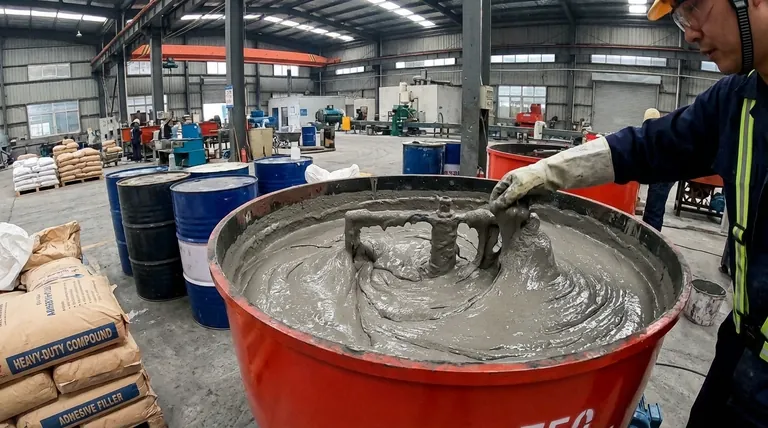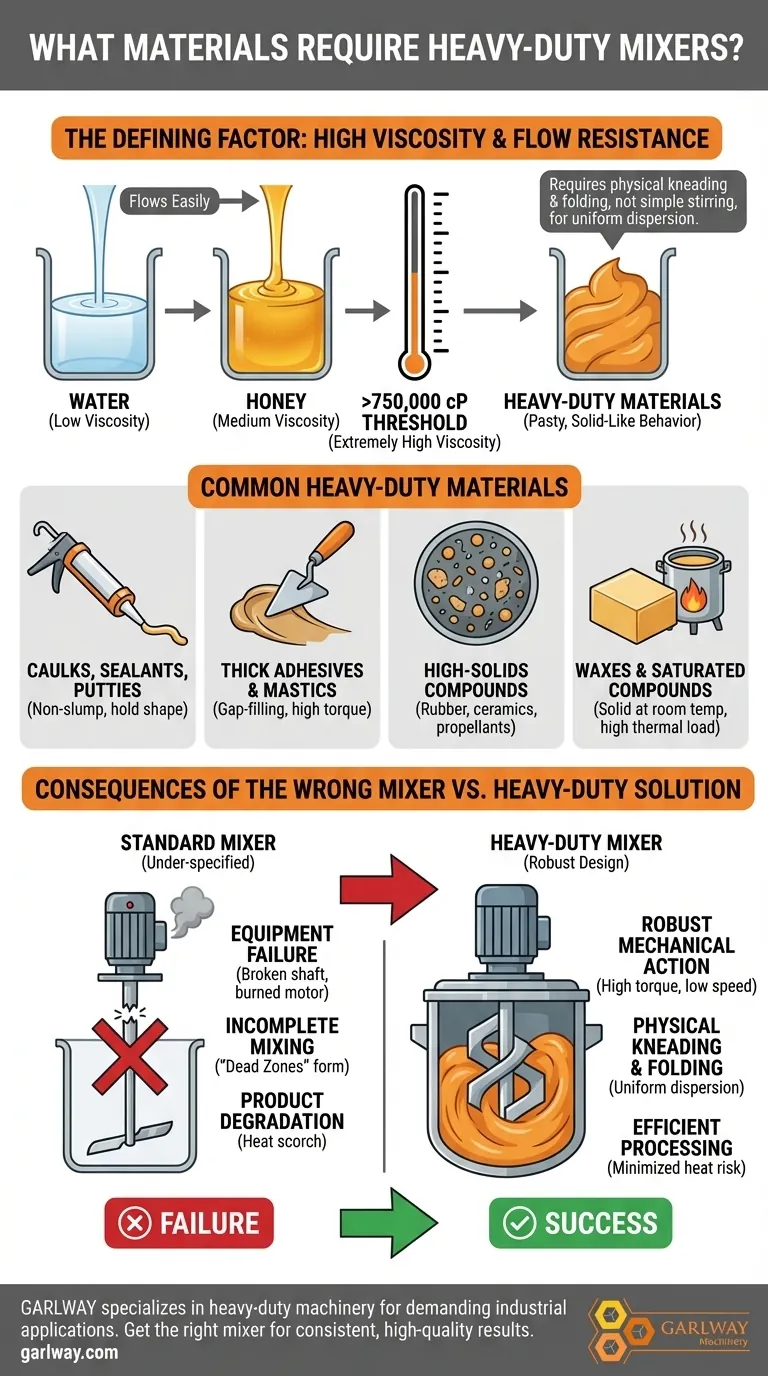Determining the need for a heavy-duty mixer comes down to the physical properties of your material, not just its name. These mixers are engineered for substances with extremely high viscosity—generally exceeding 750,000 centipoise (cP)—that behave more like solids than liquids. This category includes thick slurries, dense pastes, wax compounds, and putties, which would stall, overheat, or break standard mixing equipment.
The choice to use a heavy-duty mixer is dictated by a material's resistance to flow. When a substance is so thick that it requires physical kneading and folding rather than simple stirring, a heavy-duty design becomes non-negotiable for achieving a homogenous mixture and preventing equipment failure.

The Defining Factor: Understanding High Viscosity
The primary reason a material requires a heavy-duty mixer is its viscosity—a measure of its internal friction or resistance to flow. As viscosity climbs to extreme levels, the physics of mixing changes dramatically.
What is Viscosity?
Think of viscosity as a fluid's "thickness." Water has a very low viscosity and flows easily. Honey has a much higher viscosity and flows slowly. Heavy-duty mixing applications deal with materials that are hundreds of thousands of times more viscous than water.
The 750,000 cP Threshold
This figure is a critical benchmark where materials typically cease to be "stirrable." For context, peanut butter is around 250,000 cP. Materials above 750,000 cP will not form a vortex or flow toward a spinning blade; they will simply resist the motion, requiring immense force to manipulate.
Beyond Viscosity: Pasty Behavior
Many challenging materials are also "pasty." This means they have a very high percentage of solids suspended in a liquid binder. These materials require not only high torque to move but also a mixing action that physically smears and folds the ingredients to ensure the solids are uniformly wetted and dispersed.
Common Materials Requiring Heavy-Duty Mixing
While viscosity is the technical measure, several common industrial product categories consistently fall into the heavy-duty range.
Caulks, Sealants, and Putties
These products are designed to be non-slump and hold their shape. Their formulations require powerful, low-speed mixers that can blend thick polymers, fillers, and plasticizers without introducing unwanted heat.
Thick Adhesives and Mastics
Adhesives formulated for gap-filling or vertical applications are extremely thick. The goal is to achieve a perfectly uniform dispersion of resins and fillers, which is only possible with the high-torque action of a heavy-duty mixer.
High-Solids Compounds
This includes a broad range of materials like rubber compounds, certain ceramics, solid rocket propellants, and composites. The challenge is to wet out and distribute massive volumes of solid powders into a very small volume of liquid binder, a task that demands a kneading and shearing action.
Waxes and Saturated Compounds
Materials like buffing compounds or filled waxes can be solid at room temperature and extremely viscous when heated for mixing. The equipment must handle not only the high torque but also the thermal load required for processing.
The Consequences of Using the Wrong Mixer
Attempting to process these materials with an under-specified mixer is not just inefficient; it's a direct path to failure.
Immediate Equipment Failure
The most common outcome is a burned-out motor, a bent agitator shaft, or a broken gearbox. The immense resistance of the material overloads the mechanical components of a standard mixer, leading to catastrophic failure.
Incomplete Mixing and "Dead Zones"
A standard impeller will carve a small cavern around itself while the rest of the batch remains completely stationary. This results in a useless, non-homogenous product with massive variations in quality and performance.
Product Degradation
The immense energy required to force a standard mixer through a thick material is often converted into heat. This can scorch or degrade temperature-sensitive ingredients, ruining the entire batch. Heavy-duty mixers are designed to apply torque efficiently at low speeds, minimizing this risk.
How to Apply This to Your Project
Your material's specific behavior dictates the best mixing strategy.
- If your primary focus is on thick, flowable pastes (e.g., thick inks, adhesives): Prioritize planetary or multi-shaft mixers whose blades move through the entire vessel to ensure complete turnover and eliminate dead spots.
- If your primary focus is on extremely dense, non-flowing compounds (e.g., putty, rubber): You need high-torque kneaders or sigma blade mixers that physically compress, stretch, and fold the material to achieve dispersion.
- If your primary focus is on temperature-sensitive materials: Select a low-speed, high-torque mixer with a jacketed vessel for precise heating or cooling control during the mixing cycle.
Ultimately, matching the mixer's mechanical action to your material's unique resistance is the key to successful, repeatable processing.
Summary Table:
| Material Category | Key Characteristics | Typical Viscosity |
|---|---|---|
| Caulks & Sealants | Non-slump, thick polymers | >750,000 cP |
| Thick Adhesives | Gap-filling, vertical application | >750,000 cP |
| High-Solids Compounds | Rubber, ceramics, composites | >750,000 cP |
| Waxes & Compounds | Solid at room temperature | >750,000 cP |
Struggling with high-viscosity materials? GARLWAY specializes in heavy-duty construction machinery, including robust concrete mixers designed for demanding industrial applications. Our equipment delivers the high torque and precise mixing action needed for thick pastes, sealants, and compounds. Contact us today (#ContactForm) to find the perfect mixer for your challenging materials and ensure consistent, high-quality results.
Visual Guide

Related Products
- Commercial Construction Mixer Machine for Soil Cement Mixing Concrete
- Ready Mixer Machine for Construction Ready Mix Machinery
- Portable Concrete Mixer Machine Equipment for Mixing Concrete
- Hydraulic Concrete Mixer Machine Cement Mixing Equipment for Mixture Concrete
- JZC400 Mobile Small Concrete Mixer Cement Mixer Machine
People Also Ask
- What is the purpose of a concrete mixer? Achieve Perfect, On-Demand Concrete Mixes
- What maintenance practices extend a concrete mixer's lifespan? A Proactive Guide to Maximize Equipment Life
- What is the role of concrete mixers in construction? Boost Quality, Efficiency, and Speed
- What is a good size concrete mixer for small projects? Find the Perfect 3-5 Cu Ft Mixer for Your Job
- What is the purpose of concrete mixers in construction? Ensure Quality, Efficiency & Durability



















